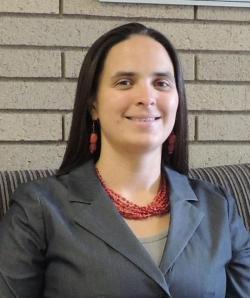Assistant Professor, Frances Payne Bolton School of Nursing; Assistant Director, Doctor of Nursing Practice Program; Co-Director, Collaborative Practice I, Office of Interpersonal and Interdisciplinary Education and Research
The time that Jesse Honsky spent advising undergraduate students at the Frances Payne Bolton School of Nursing on their capstone experiences was mutually beneficial: while she guided students through their semester-long projects—all of which must be focused on public, community or population health—she was learning something about learning. “That kind of project-based work is so helpful for students because they have to think about how they put something together. The process of building something takes some time and skill. Sometimes, you can’t learn something until you actually do it,” she says. Her observations helped to solidify her growing passion for experiential teaching and learning, something she now puts into practice every day as the Co-Director of Collaborative Practice I, a service-learning, community-based experience that’s offered to entry level health profession and social work students. Read more about Jesse Honsky.
What led you to study public health and teaching?
I went to a small college in Minnesota and was a nursing undergrad. As a student, we rotated through different nursing specialties. When I got to public health and started reading the textbooks, it just struck me in a way that no other specialty had. I think what stayed with me was that balance between taking care of people and thinking long term about how we can make the community healthier. There’s also a very strong social justice focus in public health. It all just really spoke to me at the time.
In terms of teaching, I had a conversation with one of my mentors shortly after I graduated from nursing school about what my future career was. My mentor said that nursing faculty were always in high demand and that they couldn’t educate enough nursing students because there weren’t enough faculty. My public health brain said, ‘Well, let’s get to the source of that problem,’ so I then started to think about teaching.
How did you become interested in experiential teaching?
In my career, I’ve tended to lean toward experiential teaching. In nursing, I’ve done a mix of clinical and community clinical teaching, which gets students outside the four walls of a hospital setting—things like vaccine clinics and going into schools, for example.
But really, things aligned for me over time. Since my background is in public health, I do believe that it's important that our students engage with the community. You just learn so much more about your patient population if you can understand where they come from. If you can relate to the community better, then you can serve them better. When students are out in the community, it builds their empathy and gives them the experience they need to help their patients navigate the healthcare system.
You studied abroad in South Africa as an undergraduate nursing student. How did that shape your lens as a nurse and as a human being?
I was very fortunate to have that experience—it’s exciting to be in a new place during college, which is just this naturally exploratory time anyway. But being in South Africa gave me the opportunity to analyze a different healthcare system and to be exposed to completely different cultures. The combination of the two led me to reflect a lot on our culture here in the US and to listen with a much more critical ear. As a young person, I think that I didn’t fully see the disparities that we have in this country until I went to South Africa. Part of it was being young and part of it was where and how I was raised. Sometimes, you have to experience something to see it and to understand it.
Is there a theme to the feedback you get from students in the collaborative practice class?
It’s always interesting. Sometimes, the students don’t see the connection directly between what they’re doing in the class and then what they’re going to do as a health or social work professional right away. That takes some time for some students. But the comment that I get most frequently is that the students really appreciate being able to connect with the community. They like to learn about local organizations and to build relationships with their project champions—those are the students’ main points of contact at whatever organization they’re working with. And in the end, when they build those bonds and connections, and when they invest their time in the community, they feel that they can understand and serve the community better.


